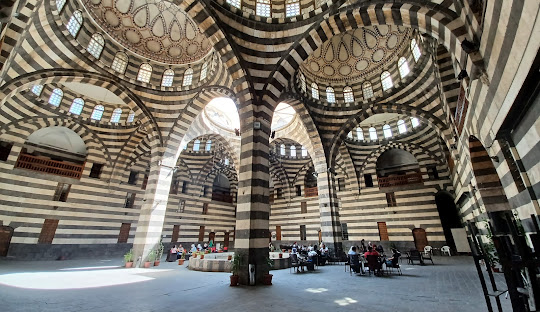Damascus, Syria
🕌 Damascus, Syria
“The Eternal City of the Levant”
🗺️ Overview
Damascus, one of the oldest continuously inhabited cities in the world, stands as a living museum. With layers of Roman, Umayyad, Ottoman, and Arab culture, it offers a deep and stirring journey through Middle Eastern history. Despite recent turmoil, the city remains a beacon of resilience and cultural pride, with many parts gradually welcoming back travelers.
Fly All Over Rating: 7.5/10
✔️ Deep historical significance and ancient architecture
✔️ Authentic Levantine culture and cuisine
✔️ Soulful markets and mosques
❌ Political and safety concerns
❌ Limited tourism infrastructure currently
✈️ Getting There & Around
-
Main Airport: Damascus International Airport (DAM)
-
Transport:
-
Taxis: Widely used, but fare negotiation is common
-
Public Minibuses: For locals, not tourist-friendly
-
Walking: Old Damascus is very walkable
-
🌟 Top Attractions
🕌 1. Umayyad Mosque
One of the grandest and oldest mosques in the world. A spiritual and architectural marvel with Byzantine and Islamic influences.
🏛️ 2. Old City of Damascus
Wander through narrow alleys, ancient churches, mosques, and souks. Home to Roman gates and hidden courtyards.
🛍️ 3. Al-Hamidiyah Souq
A vibrant traditional bazaar selling textiles, spices, crafts, and sweets. Don’t miss the iconic pistachio-laden Bakdash ice cream.
⛪ 4. Chapel of Saint Ananias
An underground Christian worship site from the first century AD—deeply significant for Christian history.
🏰 5. Citadel of Damascus
An ancient fortress that has withstood centuries of invasions and sieges, currently undergoing restoration.
🍽️ What to Eat
Must-Try Dishes
-
Shawarma – Spiced meat shaved from a rotating spit
-
Kibbeh – Ground meat and bulgur balls, fried or baked
-
Fatteh – Chickpeas, yogurt, and crispy bread
-
Mulukhiyah – Leafy green stew with rice and chicken
-
Barazek – Thin sesame and pistachio cookies
Recommended Spots
-
Naranj Restaurant – Upscale with traditional Damascene cuisine
-
Beit Jabri – Atmospheric courtyard dining in the Old City
-
Bakdash Ice Cream – Famous Arabic-style ice cream parlor in the souq
🏨 Where to Stay
💰 Budget
-
Al-Majed Hotel – Basic but central accommodations
-
Beit Al Mamlouka – A traditional boutique hotel in a restored Damascene house
🏨 Mid-Range
-
Talisman Hotel – Lavish interiors with a historic charm
-
Old Vine Hotel – Cozy stay with Syrian hospitality
🌟 Luxury
Due to ongoing sanctions and conflict, many international luxury brands are not currently operating in Damascus.
🛍️ What to Buy
-
Damascene Silk & Brocade – Luxurious textiles with intricate patterns
-
Handmade Soaps – Especially Aleppo soap made with laurel oil
-
Spices – Sumac, za'atar, and spice blends unique to the Levant
-
Copperware – Hand-engraved trays and kettles
-
Inlaid Mosaic Boxes – Exquisite handcrafted wooden pieces
📅 Best Time to Visit
-
Spring (March–May) – Pleasant temperatures and blooming gardens
-
Fall (September–November) – Ideal weather and fewer crowds
-
Avoid: Summer heat (June–August) and potential travel restrictions during political unrest
🛡️ Travel Tips
-
Visa: Required for most nationalities; check with Syrian embassy
-
Currency: Syrian Pound (SYP); carry cash
-
Language: Arabic; very limited English spoken
-
Safety: Consult government travel advisories before traveling
-
Dress Modestly: Especially in religious areas and conservative neighborhoods
-
Photography: Always ask before photographing people or military areas
📊 Damascus Ratings
| Category | Score | Notes |
|---|---|---|
| Historical Significance | 10.0 | Arguably unmatched in the Arab world |
| Culture & Heritage | 9.0 | Deep-rooted, resilient, and living traditions |
| Food & Cuisine | 8.5 | Rich Levantine flavors and legendary street food |
| Safety & Accessibility | 5.0 | Travel advisories and geopolitical tensions |
| Tourism Infrastructure | 6.0 | Limited options, but improving gradually |
| Affordability | 8.0 | Inexpensive for travelers |
| Authentic Experience | 9.5 | Minimal commercialization, deeply authentic |
| Overall Travel Value | 7.5 | Best for adventurous and culturally curious travelers |
🧭 Final Word
Damascus is not just a city—it’s a living manuscript of human history, culture, and perseverance. While travel to Syria still comes with significant considerations, for those who go, the rewards are immense. From ancient relics and sacred shrines to fragrant souks and Damascene hospitality, this city echoes a thousand stories waiting to be heard.


